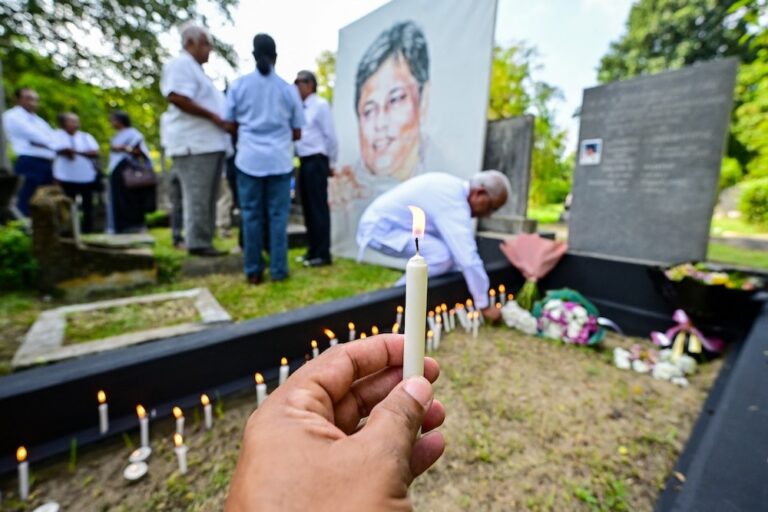(FMM/IFEX) – The Free Media Movement vehemently condemns the imposition of Emergency (Prohibition on Publication and Transmission of Sensitive Military Information) Regulation No.1 of 1998 which was promulgated on 5 June 1998, as a grave violation of the basic democratic rights of the people of Sri Lanka. It is a flagrant violation of the commitment […]
(FMM/IFEX) – The Free Media Movement vehemently condemns the imposition of
Emergency (Prohibition on Publication and Transmission of Sensitive Military
Information) Regulation No.1 of 1998 which was promulgated on 5 June 1998,
as a grave violation of the basic democratic rights of the people of Sri
Lanka. It is a flagrant violation of the commitment made by this government
in its election manifesto to defend media freedom.
The Free Media Movement is equally concerned about the fact that for the
first time the sole responsibility of censoring military news has been given
to a military officer, breaking with the democratic tradition of civilian
control over the military.
On two occasions in the past years, in September 1995 and in April 1996 (see
IFEX alerts), when the government imposed censorship of military news, the
consequences were quite negative. There was also no advantage for the troops
on the battlefront at the time. It was also conclusively proved that
censorship of military news could not prevent the people from getting to
know about the losses and setbacks suffered by the military in the course of
the conflict. The Free Media Movement believes that the imposition of
censorship is aimed at preventing the media from reporting the truth about
the war to the people of this country. Therefore, it is obvious that this is
more a part of a political strategy than a military requirement.
It is already clear that censorship of military news is aimed at making only
the state version and pronouncements about the war available to the people.
This censorship will also prohibit accurate reporting of whatever
discussions on the ethnic conflict take place during the forthcoming
election campaign for the Provincial Councils. The Free Media Movement
strongly feels that this would restrict the ability of the people to make an
informed choice at the elections.
Therefore, the Free Media Movement calls upon the government to withdraw the
Emergency Regulation (No. 1 of 1998) that has imposed censorship of military
news.
Note: Appended to the end of this action/press release is the text of
Emergency Regulation (No. 1 of 1998).
Regulations made by the President under Section 5 of the Public Security
Ordinance
Colombo
05 June 1998.
Regulations
1. These regulations may be cited as the Emergency (Prohibition on
Publication and Transmission of Sensitive Military Information) Regulations,
No.1 of 1998.
2. No Editor publisher of a News Paper or any person authorised by under
law, to establish and operate a Broadcasting station or a Television Station
shall whether in or outside Sri Lanka, print, publish, distribute or
transmit, whether by means of electronic devices or otherwise or causes to
be printed, published, distributed, or transmitted whether by electronic
means or otherwise, any material containing any matter which pertains to any
operations carried out or proposed to be carried out by the Armed Forces or
the Police Force (including the Special Task Force), the deployment of
troops or personnel, or the deployment of or use of equipment, including air
craft or navel vessels, by any such forces, or any statement pertaining to
the official conduct or the performance of the head or any member of the
Armed Forces or the Police Force.
3. When any person prints, publishes, distributes or transmits or causes to
be printed, published, distributed or transmitted whether by electronic
means or otherwise any matter in contravention of the provisions of
Regulation 2 the competent authority may after issuing such directions as he
considers necessary to effect compliance with the provisions of such
Regulation, make order that the press or equipment used foe such printing,
publication, distribution or transmission shall for such period as is
specified in that order not be used for the propose of printing,
publication, distribution or transmission of any matter referred to in
Regulation 2 and the Competent Authority may by the same order any person
specified therein to take such steps as appears to the person or authorised
to be necessary for preventing the printing , publication, distribution or
transmission of any such material.
4. The President may for the propose of these Regulations, appoint, by name
or by office any person or body of persons to be the Competent Authority.
5. Any person who prints, publishes, distributes, or transmits any material
contravention of the provision of regulation 2 shall be guilty of an
offence.


